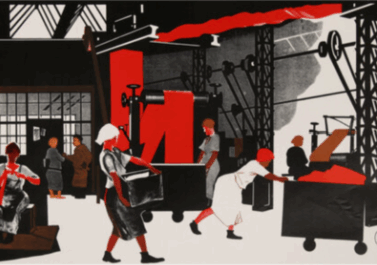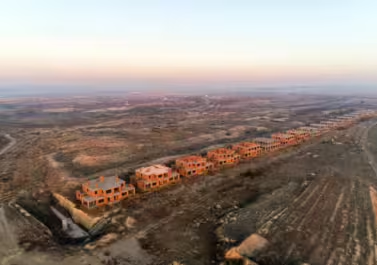
This is the first article of a short series we are planning on the hot topic (!) of climate change. This first text is meant as a short introductory piece that sets out the basic perspective of how we understand the climate crisis in relation to the struggle for communism and the role of workers’ self-organisation. As our group develops, we are trying to encourage more of the collective to write texts. To that end, this is an effort in collective writing (not easy!) from three of our comrades.
A second text (written by another comrade) will be published in a few days and will drill down a bit more into why we think the promises of COP26 will come to nothing, as well why the process towards working class emancipation is a fundamental element for saving our planet.
Climate change is well and truly upon us. All over the world’s media, there are now daily reports about the climate crises building and spreading across the planet. Looking increasingly biblical, the news shows floods, fires, people being forced to leave their homes, and much, much more. With the publication of the recent IPCC report (on top of the mountains of science showing pretty much the same thing), we know that none of this is going to get better any time soon and the future looks increasingly bleak for everything and everyone on the earth.
There have always been committed climate activists who have taken direct action to stop motorways and train lines being built through woodland and conservation areas. There have always been people prepared to break the law to stop runways being built. In the last few years though, there has been a bigger wave of protests around the climate crisis and other aspects of ecological degradation. They are becoming more disruptive to the general population (e.g. Insulate Britain and Extinction Rebellion blocking roads), as well as attracting a wider range of people (school children, older people). There’s been a marked stepping up of media coverage, and a rush for corporations to release their greenwashing statements at the current COP26 summit in Glasgow. As we speak, loads of activists have made the trek up to Glasgow to demand some kind of action to slow, and hopefully prevent, the worsening of this unfolding climate catastrophe.
Humanity at a crossroads
Without the actions of these committed activists, the State and media would have been able to ignore reality to a much greater extent. On the other hand, a balance sheet of the results of such campaigning shows that their pressure has, at best, limited results. The history of the COP summits has been one of inadequate targets set and then missed. Local governments can and do declare climate emergencies with little or no effect. Meanwhile, Extinction Rebellion, with their media-friendly and disruptive activities, are starting to see that there is no gesture so radical that it cannot be recuperated, with fossil fuel producers and investors all over the world rebranding as vanguards in the struggle to save the planet.
Environmental movements are made up of alliances of people who have made a personal choice that this is an issue they think is important and needs urgent action taking on. But even whilst acknowledging that ‘system change’ is needed, the general aim of many of these activities has been to put pressure on governments and corporations to change, while leaving the fundamental structure of society basically untouched.
Overlapping with these protests are the plans of the left and establishment green lobbies for variants of a Green New Deal. Their strategy is based on advocating more supposedly ecologically-friendly economic activities to save us, which leaves the power of capital unchallenged. In doing so, they ignore or deny the predatory nature inherent in the competitive and expansionist nature of capitalism. That drive has brought humanity to the edge of this abyss, and yet we’re supposed to believe that that same system will change its spots and end up saving us? Our only hope is a genuinely revolutionary transformation of society, moving beyond capitalism and its in-built drive to exploit and extract.
We want to break free…
If this sustainable and egalitarian future that we need and want is to be won, then it will be achieved in defiance of, not in an alliance with, the power of capital. Workers’ self-organisation will be the key to winning, and that’s because the root of the problem lies with capital and its’ dynamic of constant expansion through work and the exploitation of workers, rather than it being about personal morals or flawed humanity. To be able to create the world we want means being able to actually overthrow the reproduction and expansion of capital, not just demand states and corporations make it slightly less destructive for us.
Part of this means breaking free from false friends, the state and corporations being obvious ones, but also the trade unions. Just like the other peddlers of the Green New Deal, the trade unions depend on the continuation of the capitalist system for their very existence. Their ability to exist depends on their role of ‘defending members’ jobs and interests’. In general, that keeps their members trapped in the capitalist framework, but this also has ramifications around ecological degradation. To ‘defend their members’ interests’, the unions support violently negative projects such as the expansion of Heathrow Airport. The same applies to countless other infrastructure projects, particularly around building new roads, as well as the millions of other jobs servicing and supporting ecologically destructive activities.
What now then?
Any movement against capital (or one that has the potential to be) is going to be messy, sometimes confusing, demanding contradictory things, and even have some elements to it that we find hard to mesh with our politics. It might even emerge from issues and struggles that surprise us.
As a handful of anti-authoritarian communists we try and analyse, understand, and intervene what’s going on around us, but we do not imagine that we can impose any next steps. We think that the wider global working class is the only force that can reconstitute the social order to point us towards an ecologically sound society based on human need, rather than one dominated by the needs of capital. This is because it is us, not the capitalists, that actually make this world and produce everything in it; it is us who have the social knowledge to remake a different kind of world; we are the ones that have an interest in actively overturning this system because we are the ones exploited within it. That’s why we look for workers’ self-organisation – as a way to build our confidence, take back some control, discover and use our own power, to build links with other workers around the world – as a fundamental element that has to connect with the drive against ecological destruction.
One terrain for this type of communist intervention might be around rising temperatures. We are often only fed the line that this only concerns people in hot and poor countries. But there are hundreds of thousands of workers across Europe and the US who already dread every coming summer. We have to sweat in sweltering factories, mines, building sites, and lorries; and many suffer from heat stress and kidney disease. We need to start agitating for heat strikes and build links between these disputes and the vast movements of proletarians in other parts of the world who are already fighting climate change. Hundreds of them are killed every year by governments, gangs, and paramilitaries while defending their ecosystems or protesting heat shocks due to power cuts. Solidarity with refugees fleeing from these climate conflicts should also be just a small extension of this larger resistance.
Seizing control of workplaces would be necessary to repurpose them to make what we actually need and move away from ecologically destructive production. But even though we know work and these struggles at work are key, we cannot ignore the social movements that emerge from outside the sphere of work. We need to build more bridges between workers’ struggles in the productive sphere and the social movements in the streets. We need to carry on discussing the ideas of ‘socially necessary’ work and bullshit jobs that the pandemic brought into focus. Bringing together these struggles will be crucial to build a class-based movement capable of challenging capital’s drive to destruction. The struggle for climate justice cannot be fought as a ‘single’ issue. It brings the whole system, and our roles in it, into question.



